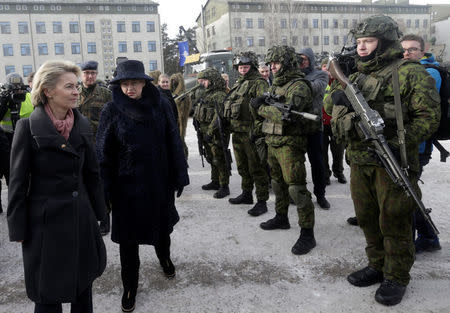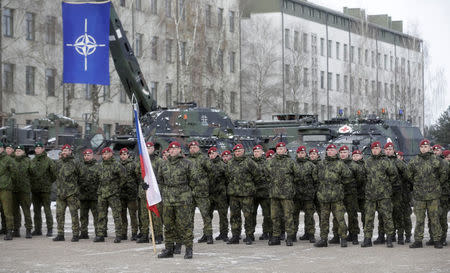NATO troops deploy in Lithuania, underscoring commitment to defense
By Andrius Sytas and Andrea Shalal RUKLA, Lithuania (Reuters) - Germany and NATO on Tuesday underscored their commitment to beefing up the defense of eastern Europe's border with Russia as the first of four new batallions under the North Atlantic alliance's banner arrived in Lithuania. In moves agreed last year under former U.S. President Barack Obama, NATO is expanding its presence in the region to levels unprecedented since the Cold War, prompted by Russia's annexation of Crimea and accusations - denied by Moscow - that it is supporting a separatist conflict in eastern Ukraine. The German-led battle group of 1,000 troops in Lithuania will be joined this year by a U.S-led deployment in Poland, British-led troops in Estonia and Canadian-led troops in Latvia. They will add to smaller rotating contingents of U.S troops. Doubts about the U.S. commitment to NATO have surfaced since the election of President Donald Trump, who has described NATO allies as "very unfair" for not contributing more financially to the alliance. German Defense Minister Ursula von der Leyen said Europe realized it needed to strengthen defense cooperation and was doing more to solve its own problems. She also said U.S. Secretary of Defense James Mattis reassured her about Washington's commitment to NATO in a recent telephone call. "After what we discussed, I have no doubt about his deep conviction in the importance of NATO and the commitment of the Americans within NATO to what we have agreed," she said at a welcoming ceremony at Lithuania's Rukla military base, 100 kilometers (62 miles) from the Russian border.Von der Leyen is due to hold her first meeting with Mattis in Washington on Friday. In a phone call on Sunday with NATO Secretary General Jens Stoltenberg, Trump agreed to meet alliance leaders in Europe in May. Lithuanian president Dalia Grybauskaite said the German battalion was arriving "(at) the right place and at the right time," adding she hoped the troops' stay would be peaceful. A NATO official said the NATO forces would participate in a major exercise in eastern Europe in June. A second official said it would include a simulated nuclear attack. There are no end dates for stay of the new contingents, which will rotate every six months partly to comply with NATO's 1997 promise to Russia to avoid "permanent stationing of substantial combat forces" in Central and Eastern Europe. German officials said the battalion in Lithuania, which includes over 200 tanks and other ground vehicles, will be fully formed by June 2017, including troops from Belgium, the Netherlands, Norway and Luxembourg. (Reporting by Andrea Shalal and Andrius Sytas; editing by John Stonestreet)




